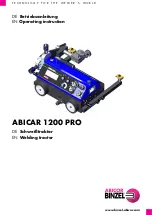
80-9395-9521-020 Rev/1 (06-16)
ASSA ABLOY
Norton is a brand associated with Yale Security Inc., an ASSA ABLOY Group company.
Copyright © 2016, Yale Security Inc. All rights reserved. Reproduction in whole or in part
without the express written permission of Yale Security Inc. is prohibited.
Left Hand Door
Figure 7.4
(4) #12-24 x 5/8"
Screws to mount
closer body to
mounting bracket
Figure 7.2
90°
Adjusting Rod
Main arm
Figure 7.3
90°
Regular Arm Installation Sequence
1. Remove existing LCN arm assembly, closer body and
supporting mounting hardware. If existing drop plate is
present, replace with Norton drop plate part number 9540-18.
See page 3, figure 3.2 of this instruction.
NOTE: The existing LCN drop plate must be replaced with
the proper Norton drop plate for the 9540 to perform
correctly.
2. Inspect existing mounting holes in door and frame for damage.
Consult templates listed below to confirm existing holes are
located in the proper position:
Page 5: 9540 Regular Arm Mount
Page 6: 9540 Regular Arm Mount with 9540-18 drop plate.
Improperly templated door or frame may affect door
closer performance.
3.
IMPORTANT:
Using template on Page 5, locate and prepare
two (2) additional holes for #12 screws for closer mounting
plate. Screws will be located under the spring adjust end of
closer when installed. See fastener chart page 4.
(If installing closer body on Norton’s Drop Plate page 6, these
additional holes are already present on drop plate)
4. Secure drop plate (if required) and/or closer mounting plate to
face of door with hardware provided.
Note: See templates on page 5 and 6 for proper orientation
of these plates in both Left Hand and Right Hand
applications.
5. Fasten the closer body, spring adjust end
TOWARD
hinge
edge of door and valve oriented as stated below to mounting
plate with hardware provided (Figure 7.1).
Right hand door: Valves facing UP.
Left hand door: Valves facing DOWN.
See templates on page 5 or 6 for illustrations of closer
orientation.
6. Fasten arm shoe of the adjusting rod assembly to frame face
with hardware provided. Fasten with pivot point of shoe away
from hinge. For additional 15% increase in closing force,
position arm shoe with pivot point towards hinge edge of door
as shown below. See figure 7.1 below; illustration shows left
hand door.
7. Attach main arm to closer pinion as shown below (Figure 7.2) with
main arm positioned 90° to door face. Secure to pinion with arm
screw provided.
8. Pre-load closer unit:
Ÿ
Remove rod screw from adjusting rod. Insert adjusting rod into
rectangular tube of main arm assembly (open door slightly if
needed).
Ÿ
With door in closed position, rotate main arm until adjusting rod is
90° with respect to door face as shown below (Figure 7.3).
Ÿ
Re-install adjusting rod screw and tighten to maintain closer pre-
load. Reference illustration below (Figure 7.4) for left hand door.
Figure 7.1
Left hand shown
Shoe pivot point
9.
Closer Adjustments: See page 16 for more information.
A)
Adjust closing force
using the spring adjust screw.
Rotate screw clockwise (CW) to increase force.
Rotate screw counter-clockwise (CCW) to decrease closing
force. Use hex wrench provided.
B)
Adjust closing speed and latching speed
of door using
valves identified (Figure 16.1).
Rotate valve clockwise (CW) to decrease speed.
Rotate valve counter-clockwise (CCW) to increase door
closing speed.
C)
Adjust backcheck intensity.
Rotate (CW) to increase backcheck intensity.
Rotate (CCW) to de-crease backcheck intensity.
D)
Delayed Action
: (If equipped)
Rotate valve (CW) to increase close delay time.
Rotate (CCW) to de-crease close delay time
Spring Adjust End
Page 7


































